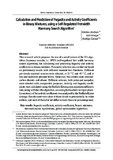Calculation and Prediction of Fugacity and Activity Coefficients in Binary Mixtures, using a Self-Regulated Fretwidth Harmony Search Algorithm
Cálculo y predicción de coeficientes de fugacidad y actividad en mezclas binarias mediante el algoritmo de búsqueda armónica con ancho de banda autoajustable
Compartir este ítem
Fecha
2017-06-30Autor
Jiménez Leiva, Cristian Camilo
Amaya, Iván
Correa, Rodrigo
Citación
Metadatos
Mostrar el registro completo del ítemDocumentos PDF
Resumen
El presente artículo de investigación propone el uso de la nueva variante del algoritmo hs (Harmony Search), esto es, el sfhs (Self-Regulated Fretwidth Harmony Search Algorithm) para el cálculo y predicción de coeficientes de fugacidad y actividad en mezclas binarias. La selección de los parámetros de ejecución del algoritmo sfhs se realizó con base en pruebas preliminares con diferentes funciones de prueba estándar. Se seleccionaron sistemas previamente reportados en la literatura, a 25 ºC y 40 ºC, y a presiones bajas y moderadas. Adicionalmente, se seleccionaron dos solutos diferentes: dióxido de carbono y etano. Se tomaron diferentes solventes, polares y no polares, con propósitos comparativos. Los coeficientes de actividad y fugacidad se calcularon utilizando la ecuación de estado Redlich-Kwong y la regla de Lewis, junto con el algoritmo sfhs para los dos solutos en fase vapor. La consistencia de los coeficientes de actividad se analizó mediante la estrategia de Redlich-Kister. Se obtuvieron resultados muy cercanos a los encontrados experimentalmente por otros autores y en su mayoría, no difirieron en más de una unidad porcentual. This research article proposes the use of a novel variant of the HS algorithm (harmony search), i.e. SFHS (self-regulated fret width harmony search algorithm), for calculating and predicting fugacity and activity coefficients in binary mixtures. Parameter selection was carried out based on preliminary results with different standard test functions. Different previously reported systems were selected, at 25 ° C and 40 ° C, and at low and moderate pressure levels. Moreover, two solutes were selected: carbon dioxide and ethane. Different solvents, both polar and nonpolar, were selected with comparative purposes. Activity and fugacity coefficients were calculated using the Redlich-Kwong state equation and Lewis rule, along with the sfhs algorithm, assuming both solutes in vapor phase. Consistency of the activity coefficients was analyzed by the Redlich-Kister strategy. Results were very close to those found experimentally by other authors, and most of them did not differ in more than one percentage unit.


